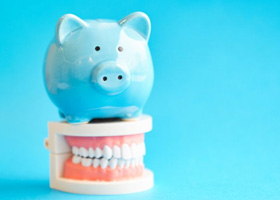Dental Crowns – Irving, TX
Restoring Compromised Teeth with Expert Care
Even having just one damaged, decayed, or otherwise compromised tooth will put you at a pretty significant disadvantage. However, you don’t have to live with these types of issues—not when restoration like dental crowns can help! These prosthetics not only protect your pearly whites, but they also help them to look as good as new. Continue reading below to learn a little more about dental crowns, the process for receiving them, and how your smile can greatly benefit from one of these incredible restorations. If you’re ready to schedule an appointment, don’t hesitate to contact us today.
Why Choose 21st Century Dental of Irving for Dental Crowns?
- Skilled Dental Team with Years of Experience
- Insurance-Friendly and Financing Options Available
- Beautiful, Natural-Looking Materials Used
What Is a Dental Crown?

A dental crown, sometimes called a “cap,” is a type of restoration that’s designed to fit over the visible surface of a tooth. They’re used to restore a damaged tooth’s structure, function, and appearance. They’re made from durable, natural-looking materials like porcelain, and they can be customized to perfectly mimic your tooth. They generally work best for patients who are dealing with one (or more) of the following issues:
- A severely decayed tooth with a filling that needs support.
- A fractured tooth in need of strength and stability.
- A follow-up procedure to a root canal.
- A dental bridge needs to be anchored in place.
- A tooth is missing and needs to be replaced with a dental implant and crown restoration.
The Dental Crown Process

The process starts with your mouth being numbed by a local anesthetic to ensure you’re comfortable. Once you are numb, our team will prepare your tooth in a very specific way in order to maximize the retention and esthetics of your new porcelain crown. After the tooth has been prepared, we will proceed with the impression stage; the impressions that we take are used to create your personalized crown.
Once the impression stage is completed, we will place a temporary (transitional) crown on your tooth. These temporary restorations are designed to protect the underlying tooth and gum tissue between dental visits, while your permanent crown is being created. Home care is extremely important while your temporary crown is in place; the health of your gum tissue and the success of your final crown depend on it! If this temporary crown is lost or damaged, don’t hesitate to let us know immediately.
When your final crown is ready, you’ll return to our Irving office to receive it. We’ll remove the temporary and quickly fit the permanent crown to the tooth, making any last-minute adjustments that may be needed and polishing it. Before you know it, your tooth will be beautifully restored! It’s not unusual for a new crown to feel mildly sensitive to cold temperatures for a few weeks; however, if this sensitivity is severe, does not subside, or makes biting uncomfortable, please let us know at once.
The Benefits of Getting a Dental Crown

There are several benefits that you’ll gain when you get a dental crown, including but not limited to:
- Tooth Protection – A dental crown covers a tooth’s damaged area, helping to prevent the need for future invasive procedures like a root canal or extraction.
- Improved Oral Function – A crown is designed to improve your mouth’s ability to chew, as well as speak, by covering up a tooth’s broken or decayed portion.
- Long-Lasting Results – If you properly maintain a crown, it can last for 10 or even 15 years; it’s a long-term investment in your oral wellness.
- Boosted Self-Esteem – It goes without saying that having a complete and beautiful smile can send your confidence soaring!
Understanding the Cost of Dental Crowns

Understanding the cost of dental crowns in Irving doesn’t have to be like rocket science! Our team is here to help you through every step of the way, from maximizing your dental insurance benefits to setting you up with a monthly payment plan. Rest assured, your budget is one of the things we’ll talk about during your dental crown consultation. In the meantime, feel free to scroll through this section so you know what to expect.
Factors that Affect the Cost of Dental Crowns

No two crown treatments are exactly alike, so there’s no standard price for this type of restoration. That said, we don’t want to leave you completely in the dark about your potential expenses. Here’s a list of factors that can affect your final treatment bill:
- How badly your tooth is damaged
- Whether or not you’ll be needing preliminary treatment
- The type of material you choose for your crown (we offer all-porcelain, composite, porcelain-fused-to-metal, and all-metal crowns)
- It can be difficult to decide which type of material you would prefer for your crown; don’t hesitate to ask us about the pros and cons of each type!
Does Dental Insurance Cover Dental Crowns?

Typically, crown treatments are considered to be “major procedures.” Most dental insurance companies cover at least 50% of the associated costs. However, every policy is different. It’s worth reading the fine print of your plan – or asking our knowledgeable team to help you determine what’s covered and what isn’t. At the end of the day, we want you to save as much money as possible and will do our best to maximize your benefits.
Other Options for Making Dental Crowns Affordable

Since dental insurance isn’t an option for everyone, we proudly offer an alternative financial solution for patients without coverage.
Thanks to our partnership with CareCredit and Lending Club, our patients can apply for monthly payment plans that will break down their total bill into more bite-sized chunks. Many plans from these trusted third parties come with little-to-no-interest, meaning you won’t have to worry about your costs snowballing into larger sums while you pay at your own pace. Let us know if you’re interested, and we can help you apply!
Dental Crown FAQs
Are Dental Crowns Permanent?
While dental crowns are not permanent, they are certainly a long-term solution. On average, they can protect a tooth for between five and fifteen years before needing replacement. However, the process of placing a crown is irreversible since the enamel removed will not grow back, so teeth that receive these devices will need to wear them for life for protection against infection and injury. Dental crowns are used to protect teeth compromised by decay or trauma, so one of these appliance can help a tooth last much longer than it would otherwise. You can keep your crown in excellent shape by practicing excellent oral hygiene, visiting the team at 21st Century Dental of Irving for regular checkups, and wearing a nightguard if you grind your teeth in your sleep. We can fit you for a customized nightguard at our office so you can enjoy superior protection.
How Do You Know When a Dental Crown Needs to Be Replaced?
While only a qualified dentist such as Dr. Roy, Bristow, or Kumar can authoritatively determine if a dental crown needs to be replaced, there are a few signs you may notice at home that can let you know your appliance is nearing the end of its lifespan. These include:
- Pain: If your crowned tooth hurts, it may be due to decay beneath the appliance. In this case, the device will have to be removed so the infection can be resolved. Afterward, it will probably be necessary to replace the crown.
- Instability: Your crown should hold fast to your tooth at all times, so the cement securing it in place is probably compromised if you can wiggle the device around.
- Degraded appearance: Chips, cracks, and stains can make your crown less visually pleasing. Since crowns serve to restore the appearance of teeth as well as their function, this can be reason enough to replace your appliance.
- A dark line around the base: If you notice a dark grey line forming around the base of the crown, this is probably because its ceramic portion is separating from the metal piece connected to your tooth. We can replace your old porcelain-fused-to-metal crown with a lifelike restoration made from one ceramic piece.
Do Dental Crowns Get Cavities?
Dental crowns cannot get cavities since they are not made of enamel, but the teeth supporting them can still develop destructive infections that can lead to their loss. Since crowned teeth are just as likely to develop decay as uncrowned teeth, you’ll need to keep up with an excellent daily oral hygiene regimen that includes brushing, flossing, and antibacterial mouthwash. It’s also crucial to visit our office in Irving every six months for routine checkups.
Can Dental Crowns Be Whitened?
Dental crowns are made from nonporous materials like metal and ceramic, so they cannot be affected by teeth whitening treatments. While metal-free crowns are designed to blend in with the rest of your smile as closely as possible, it’s probably best to have your teeth whitened before receiving crowns so your restorations can be matched to your smile’s pearly new shade.
How Long Do Dental Crowns Last?
On average, dental crowns last anywhere from 5 to 15 years, though their lifespan can sometimes vary depending on the material used, such as if you have metal ones or get ceramic/porcelain ones. However, a crown’s longevity has more to do with personal habits and care than with the material itself. Factors like your diet, oral hygiene routine, and habits such as smoking, nail-biting, bruxism, or chewing on ice can all shorten a crown’s durability. Crowns placed on front teeth also tend to last a bit longer than those on molars, since they aren’t exposed to the same pressures of chewing.
Does It Hurt to Get a Dental Crown?
Just like with fillings, your dentist will numb your mouth before beginning crown treatment. In most cases, a local anesthetic is all that’s needed, but we can also provide sedation dentistry so that you stay as relaxed as possible. While the tooth is always numbed during the preparation stage, it’s not always needed for the final placement. After the tooth has been prepared, and sometimes after placement, it’s normal to experience some sensitivity for a few days, especially if a root canal was also involved. Over-the-counter pain relievers are usually enough to manage this, but you should call our team if the discomfort worsens. Also, remember that crowns are designed to protect weakened teeth, which often helps prevent additional pain in the long run.
Are Dental Crowns Safe?
When placed by a skilled dentist, dental crowns are considered completely safe. Tooth-colored options, such as ceramic and porcelain crowns, are also entirely free of harmful substances. For those with metal-based restorations, some patients might struggle with allergies to certain metal alloys used in crowns, though these reactions are typically mild. If you’ve had sensitivities to metal before, let your dentist know, as they may suggest a metal-free alternative. On very rare occasions, someone might react to dental porcelain, but this is highly unlikely. If you notice gum irritation, redness, or swelling near your restoration, contact our team right away, as these symptoms could point to an allergic reaction.
Are Dental Crowns Safe for MRI?
Whether or not a dental crown affects an MRI depends on the type of crown you have. Porcelain or all-ceramic crowns typically don’t interfere, but metal or porcelain-fused-to-metal crowns may pose issues. The risk is higher with older metal crowns, though modern restorations are often made with alloys that are less likely to disrupt the process. If you have a crown containing metal, it’s important to let your dentist, physician, and MRI technician know ahead of time. In some cases, the metal can distort the magnetic field or radio waves, which may cause the images to appear skewed and make diagnosis more challenging. The magnetic pull may even loosen or dislodge the crown. To help prevent these complications, you might consider getting metal-free crowns when possible, especially if future MRIs may be needed.
